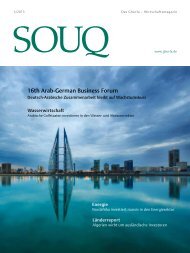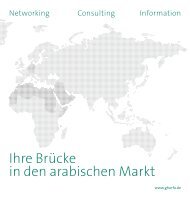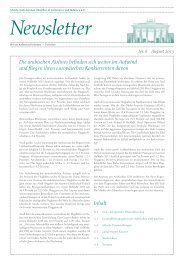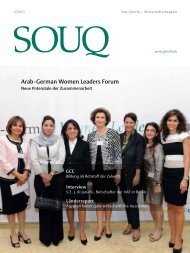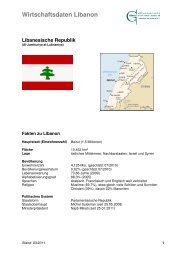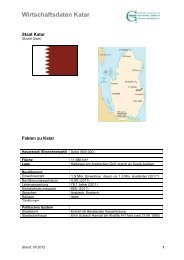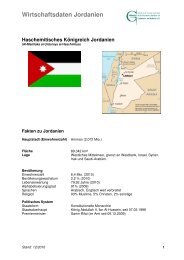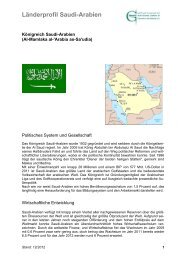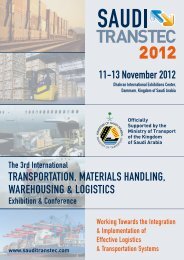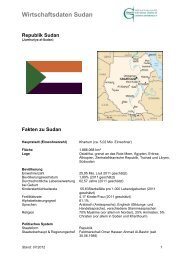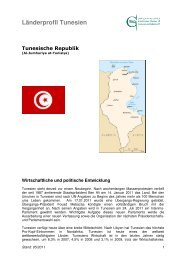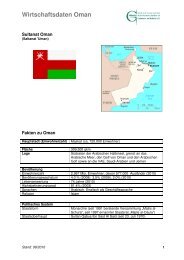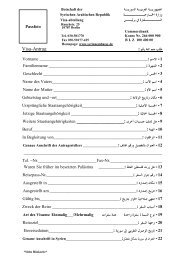Saudi-Arabien Wirtschaftshandbuch Saudi Arabia Business ... - Ghorfa
Saudi-Arabien Wirtschaftshandbuch Saudi Arabia Business ... - Ghorfa
Saudi-Arabien Wirtschaftshandbuch Saudi Arabia Business ... - Ghorfa
Erfolgreiche ePaper selbst erstellen
Machen Sie aus Ihren PDF Publikationen ein blätterbares Flipbook mit unserer einzigartigen Google optimierten e-Paper Software.
62<br />
–––––––––––––––––––––––––––––––<br />
envIronment<br />
In recent years, great efforts have been made in <strong>Saudi</strong> <strong>Arabia</strong><br />
to significantly improve environmental conservation<br />
measures and develop an awareness for the environment<br />
among the population. This is reflected in the passing of<br />
many environmental laws, improvements in the climate<br />
controls and research and the regular measurement of air<br />
pollution. Environment issues are the responsibility of a<br />
number of public and private offices. The most important<br />
office at the national level responsible for environmental<br />
protection is the Meteorology and Environment Protection<br />
Administration (MEPA). <strong>Saudi</strong> <strong>Arabia</strong> has undersigned<br />
the most important international environment<br />
conventions, for example the UN-convention on climate<br />
change (UNFCCC) and the Kyoto Protocol.<br />
During the course of the 7 th development plan (1999-<br />
2004), <strong>Saudi</strong> <strong>Arabia</strong> invested 313 billion US$ in projects<br />
aimed at improving the level of environmental protection.<br />
The current 8th plan (2005-2009) has set aside<br />
384 billion US$ for environment projects; this equates<br />
to an increase of around 23%. The planned projects and<br />
programs focus on conserving natural resources, further<br />
development of the environmental infrastructure, protecting<br />
the flora and fauna, and promoting an awareness<br />
for the environment.<br />
One central aspect of the environmental measures is the<br />
improvement of the waste management system. Following<br />
the growth in the population and the improvement in<br />
the standard of living, the quantities of household waste<br />
have risen continuously and reached a volume of 10.4<br />
million t in 2004; this equates to an approximate 440kg<br />
of waste per person per year (in comparison: United Arab<br />
Emirates 425kg; Europe 240kg). The development plan<br />
provides for the construction of eight further plants in addition<br />
to the three existing organic household waste recycling<br />
plants. Also, the number and/or capacities of the<br />
recycling plants for paper, glass, tins and metal waste will<br />
also be further increased.<br />
The treatment of medical waste produced in particular by<br />
hospitals, health care centres, and producers and dealers<br />
of medical devices, which is constantly on the rise (1999:<br />
25.500t; 2004: 30.100t), will also be addressed. Work is<br />
currently underway on drafting an integrated concept for<br />
treating medical waste.<br />
As far as the rising volumes of industrial waste are concerned<br />
(from 2.1 million t (1999) to 2.7 million t<br />
(2004)), the recycling industry does not have the capacity<br />
to recycle it all. The main reason for this is that, for<br />
cost reasons, there is no comprehensive waste separation<br />
and collection system for industrial waste.<br />
In the past few years, progress has been made in <strong>Saudi</strong><br />
<strong>Arabia</strong> in the treatment of communal and industrial<br />
waste water. Around one third of the households today<br />
are connected to the communal waste water network. In<br />
total, the existing sewage works are only capable of treating<br />
22% of the communal and industrial waste water that<br />
is generated. However it is remarkable that the treatment<br />
of waste water is completely guaranteed in the industrial<br />
towns of Jubail and Yanbuc. The construction of new<br />
waste water treatment plants and the further development<br />
of the waste water network is an important environmental<br />
policy measure for the near future.<br />
<strong>Saudi</strong> <strong>Arabia</strong> purchases almost all its environmental<br />
equipment from abroad. There is also a huge market potential<br />
for German companies here because, due to the<br />
existing deficits in the environmental protection field,<br />
the demand for this kind of technology, engineering work<br />
and equipment will continue to grow.<br />
––––––––––––––––––––––––––––––––––<br />
BilDunGS- unD GeSunDheiTSSekTOr<br />
Als wichtige Säule der sozial-ökonomischen Entwicklung<br />
widmet der Staat dem Bildungssektor besondere<br />
Aufmerksamkeit. Sichtbar ist dies z.B. am wachsenden<br />
Anteil der staatlichen Bildungsausgaben am BIP. Dieser<br />
stieg von 3,5% (1970) auf 9,5% (2006) und über 10%<br />
(2007). Die Lese- und Schreibfähigkeit erreichte dank



